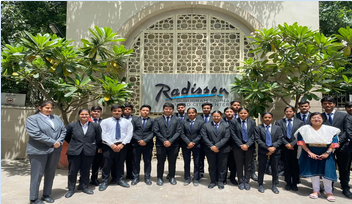

Types Of Reservations In Hotels And Resorts
Introduction
The concept of room reservation in hotels and resorts has evolved significantly over the years, especially with the advent of technology and the increase in global travel.
Reservation in the hotel industry means blocking a specific type of guest room for a designated period. With more people traveling due to globalization, improved means of travel, and increased disposable income, the demand for secure and comfortable accommodation has skyrocketed.
This has made room reservation a critical aspect of hotel management, a subject thoroughly covered in PREMIER HOTEL MANAGEMENT INSTITUTES, including The Hotel School in Delhi. In this blog, we will delve into the various types of reservations, their importance, and the different modes through which they can be made.
Different Types of Reservations in Hotels
Tentative Reservation
A tentative reservation is essentially a provisional booking. The hotel holds the room for the guest until a specified cut-off date. If the guest confirms before this date, the reservation status changes from tentative to confirmed.
Waitlisted Reservations in Hotels
In cases where a particular category of room is fully booked for a requested time period, guests can opt for a waitlisted reservation. This reservation gets confirmed only when the hotel receives a cancellation for a room in the same category.
Confirmed Reservation
A confirmed reservation is when a guest’s request for a room is accepted, and the hotel blocks the room for the specified stay dates. The hotel then sends a written confirmation to the guest, usually containing the following details:
- Name of the guest
- Date and time of arrival
- Room type
- Duration of stay
- Room rate
- Number of persons in the party
- Reservation confirmation number
- Special requests made by the guest, etc.
Importance of Reservation in Front Office Operations
Whenever I visit any Hotel Management Institute in Delhi for lectures, I emphasize the critical role that reservation plays in front office operations, especially for those just starting their careers. Reservations are not just about blocking rooms; they are the first point of contact between the hotel and potential guests. It sets the tone for the guest’s entire stay and is an opportunity to start building guest loyalty. Efficient reservation systems and well-trained staff can significantly impact the hotel’s revenue and reputation.
Different Modes of Reservations in Hotels
Written Mode
Written reservations can be made through various channels such as letters, faxes, telex, and most commonly now, emails. These are usually preferred for group bookings or during peak seasons when the demand is high. Written reservations provide a paper trail, making it easier for both the hotel and the guest to keep track of the booking details.
Verbal Mode
Verbal reservations can be made in person or over the telephone. While this method is quicker, it lacks the paper trail that written reservations provide. However, many hotels send a follow-up email confirming the verbal reservation, ensuring that the details are recorded.
Online Reservations
With the advent of technology, online reservations through the hotel’s website or third-party travel websites have become increasingly popular. This mode is convenient for guests and beneficial for hotels as it reduces the workload on front office staff.
Travel Agents and Tour Operators
Many guests prefer to make reservations through travel agents and tour operators, especially when they are unfamiliar with the destination. These agencies have tie-ups with hotels and can often offer competitive rates.
For more insights into hotel reservation systems and revenue management, you can also visit HOTELTECHREPORT
Conclusion
The reservation process is a critical aspect of hotel management and operations. It’s not just about blocking a room; it’s the first step in building a relationship with the guest. With various types of reservations and multiple modes to choose from, both hotels and guests have flexibility and convenience at their disposal. Aspiring hoteliers must understand the nuances of this process, something that is comprehensively taught in leading hotel management institutes like The Hotel School in Delhi.
Frequently Asked Questions around Reservation system
What is the importance of reservations in the hotel industry?
Reservations are crucial for managing demand, optimizing room rates, and providing an excellent guest experience.
What details are included in a confirmed reservation?
A confirmed reservation usually includes the guest’s name, arrival date and time, room type, duration of stay, room rate, and any special requests.
How reliable is a tentative reservation?
A tentative reservation is held until a specific cut-off date and is subject to availability. It’s advisable to confirm as soon as possible.
What happens if a waitlisted reservation doesn’t get confirmed?
Hotels usually inform guests in advance if a waitlisted reservation cannot be confirmed, offering alternative options when possible.
Which is the most secure mode of reservation?
Written and online reservations provide a paper trail, making them more secure compared to verbal reservations.
Understanding the reservation process can significantly enhance a hotelier’s ability to serve guests effectively, making it a vital subject in the curriculum of any esteemed hotel management institute.


